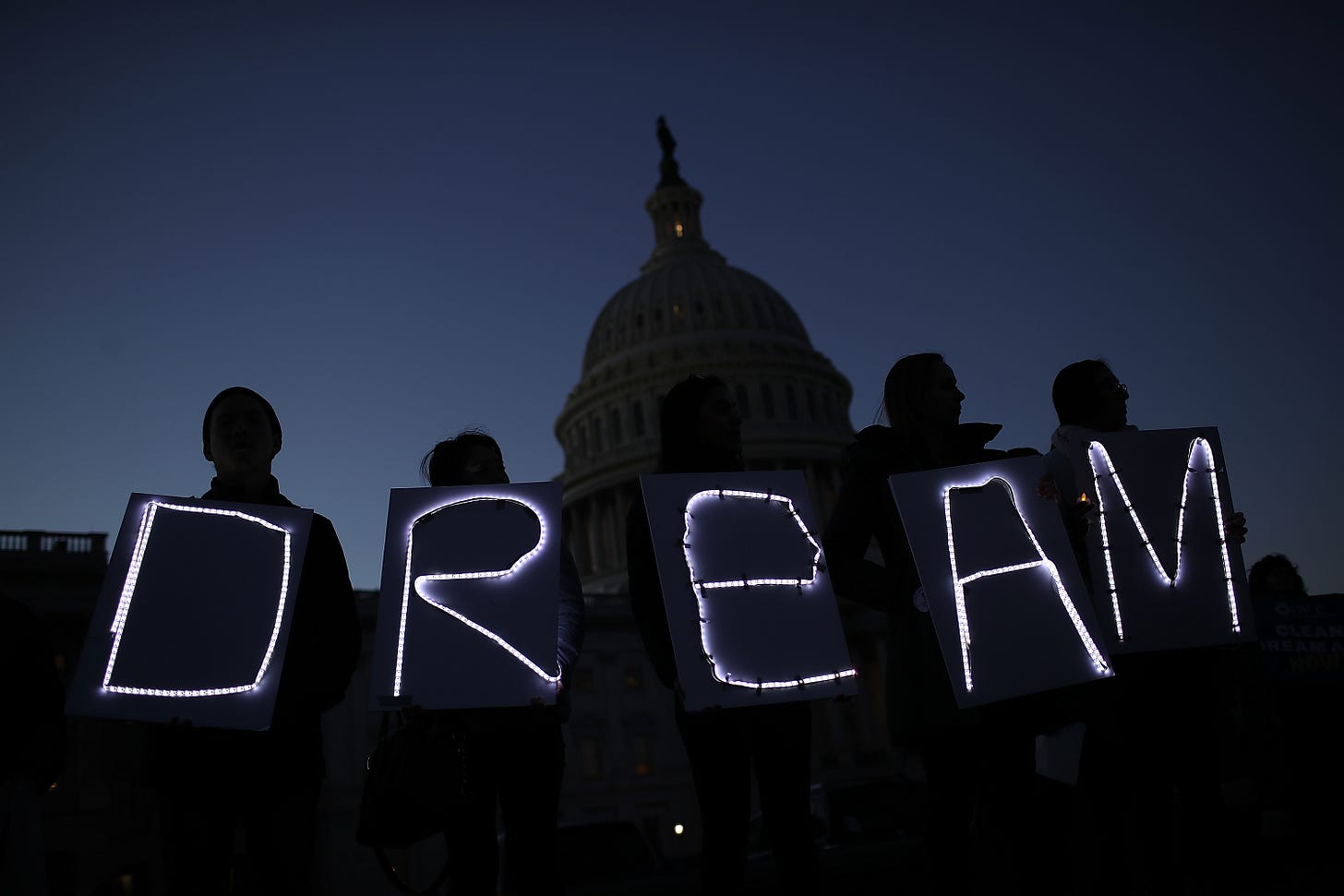Passing the DREAM Act Has Become a Nightmare
Only Congress can resolve the Dreamers’ legal limbo.

TO THE DEGREE THAT OUR POLITICS is even remotely related to policy anymore, it feels like we’re having the same arguments over and over in an endless loop—and on no issue is that truer than the Dreamers. Twenty-three years ago, Republican Sen. Orrin Hatch and Democratic Sen. Dick Durbin introduced a bi-partisan bill to give legal status to a group of young people who had been brought as children to the United States by their undocumented parents. The so-called DREAM Act was popular, even among Republicans who fretted about illegal immigration and what they considered a porous border. As of 2020, three quarters of Americans support granting permanent legal status to those brought here as children, including a majority of Republicans. But despite repeated attempts to pass legislation over two decades, either separately or as part of larger immigration bills, Congress failed to act.
Frustrated by Congress’s inertia, President Barack Obama’s administration in 2012 opted to grant temporary legal status to Dreamers through executive action. The Deferred Action for Childhood Arrivals (DACA) program granted status to some 800,000 Dreamers. But GOP governors quickly sued, and cases, including one involving a Trump administration effort to eliminate DACA altogether, have made their way up and down the federal court system ever since. A 2023 federal district court decision leaves more than 580,000 current DACA recipients in legal limbo. They have some protection from removal, but no permanent status unless and until Congress gives it to them.
Last week, Durbin held hearings on DACA. But instead of a healthy discussion about how best to fix the problem, erstwhile GOP supporters used the opportunity to pander to the MAGA crowd. Sen. Lindsey Graham, who has been a co-sponsor of some version of the Dream Act for most of his tenure in the Senate, announced, “fixing DACA is not my concern right now.” Sen. John Cornyn, a less stalwart supporter of Dreamers, claimed that “legal, orderly, and humane immigration has been the lifeblood of America,” before launching into an attack on the Biden administration for selling Dreamers a “program built on quicksand.”
Both senators preferred to talk about recent illegal border crossing numbers—which have been at historic highs but have dropped this year—and the staggering number of recent American drug overdoses. It’s a ploy that Donald Trump uses at his rallies, as if people coming to the United States looking for work and better lives are somehow responsible for the tragic deaths from fentanyl-laced drugs in America’s heartland. At least Sen. Cornyn tried to explain the connection, saying the Border Patrol was too busy apprehending asylum seekers to interdict drugs, though he ingenuously failed to mention that illicit drugs come in mainly through official ports of entry, hidden in cargo trucks and ships.
Many DACA recipients have been able to carve out precarious but productive lives over the last decade, becoming doctors, engineers, nurses, and working in myriad other critical professions, including as essential workers during the COVID pandemic. The time to legalize their status is long overdue, but it has become even more imperative with Trump’s threats to set up detention camps across the country before removing millions of undocumented people if he becomes president again.
Dreamers will be an easy target. Because they are already registered with the federal government, Dreamers will be among the easiest to find in a mass roundup of illegal immigrants, and they’re unlikely to get favored treatment in a new Trump administration. Trump’s acolyte Stephen Miller has suggested that Dreamers are part of the “great replacement,” a racist theory that suggests a grand demographic scheme to replace whites with brown-skinned people.
The Biden administration has tried and failed to protect Dreamers through executive action—just as the Obama administration did in 2012. Only Congress can give these deserving young people a way to continue their lives here. But last week’s hearing suggests the appetite isn’t there on the right.
Instead, Dreamers face a future where the military may round them up before they’re shipped off to countries they left when they were children. Miller has suggested using trains to provoke fear, which can’t help but bring up memories of Jews being transported to concentration camps in cattle cars.
America is better than this. But until Americans push their elected representatives to do what is right, we can expect more dithering. Deciding how best to stem the flow of people coming into the United States without permission is complicated—as is deciding the optimum number of immigrants we need in any given year. But ridding the country of taxpayers; home and business owners; parents, spouses, siblings, and friends of American citizens; and contributing members of our communities no sense on any level. It is inhumane. It would hurt the American economy. It is just plain wrong.



